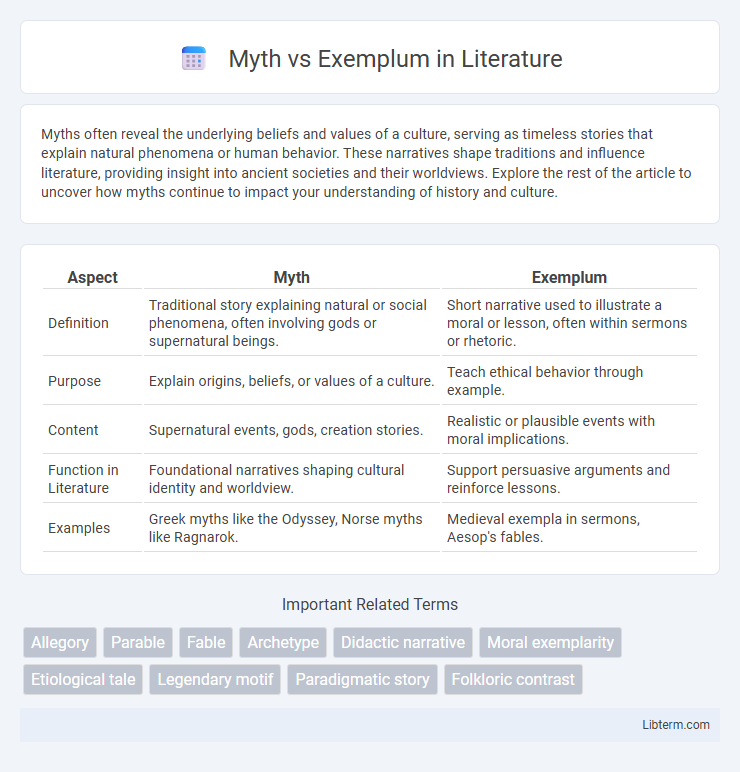Myths often reveal the underlying beliefs and values of a culture, serving as timeless stories that explain natural phenomena or human behavior. These narratives shape traditions and influence literature, providing insight into ancient societies and their worldviews. Explore the rest of the article to uncover how myths continue to impact your understanding of history and culture.
Table of Comparison
| Aspect | Myth | Exemplum |
|---|---|---|
| Definition | Traditional story explaining natural or social phenomena, often involving gods or supernatural beings. | Short narrative used to illustrate a moral or lesson, often within sermons or rhetoric. |
| Purpose | Explain origins, beliefs, or values of a culture. | Teach ethical behavior through example. |
| Content | Supernatural events, gods, creation stories. | Realistic or plausible events with moral implications. |
| Function in Literature | Foundational narratives shaping cultural identity and worldview. | Support persuasive arguments and reinforce lessons. |
| Examples | Greek myths like the Odyssey, Norse myths like Ragnarok. | Medieval exempla in sermons, Aesop's fables. |
Defining Myth: Origins and Characteristics
Myth originates from ancient narratives created to explain natural phenomena, cultural traditions, and existential questions, often involving gods, heroes, and supernatural events. Its characteristics include symbolic storytelling, oral transmission, and embedding of cultural values that shape collective identity across generations. Myths serve as foundational tales that transmit moral lessons and societal norms within a community or civilization.
Understanding Exemplum: Meaning and Purpose
Exemplum refers to a brief narrative or anecdote used to illustrate a moral lesson or principle, often found in medieval literature and rhetoric. Its primary purpose is to provide clear, memorable examples that support ethical teachings or persuasive arguments. Unlike myths, which convey traditional stories explaining natural or cultural phenomena, exempla emphasize practical, instructive messages grounded in real or plausible events.
Core Differences Between Myth and Exemplum
Myths are traditional narratives that explain natural phenomena, cultural origins, or sacred events, often involving gods or supernatural beings, serving as foundational stories for societies. Exempla are brief moral anecdotes or illustrative stories used primarily in medieval sermons to teach ethical lessons or reinforce religious doctrine. The core difference lies in myths providing cosmological explanations and cultural identity, while exempla function as practical, moral guides within specific teaching contexts.
Functions in Literature and Storytelling
Myths function as foundational narratives that explain natural phenomena, cultural origins, and universal truths, often embedding moral and spiritual lessons within symbolic language. Exempla serve as concise, instructive tales used by storytellers and preachers to illustrate specific ethical points or social behaviors, enhancing persuasive rhetoric through relatable examples. Both forms guide audience understanding and cultural values but differ in scope, with myths offering broad cosmological frameworks and exempla providing targeted moral instruction.
Cultural Significance of Myths
Myths serve as foundational narratives that shape cultural identities by embodying collective values, beliefs, and worldviews across generations. They function as symbolic frameworks that explain natural phenomena, human origins, and societal norms, often influencing rituals, art, and moral codes. Exempla, in contrast, are brief didactic stories used primarily in medieval literature to illustrate moral lessons but lack the deep cultural and cosmological significance attributed to myths.
Moral Lessons in Exempla
Exempla are short, illustrative stories used in medieval sermons to convey clear moral lessons, distinct from myths which often explain natural phenomena or cultural origins through symbolic narratives. The primary function of exempla is to provide practical ethical guidance by depicting virtuous or sinful behavior and its consequences in relatable contexts. These narratives actively engage listeners by offering concrete examples that reinforce Christian values and social norms.
Historical Evolution of Myths and Exempla
Myths originated as ancient narrative frameworks embedded in cultural traditions, evolving through oral transmission to explain natural phenomena and societal values with symbolic meanings. Exempla emerged in medieval Europe as didactic stories used by preachers within sermons to illustrate moral lessons or theological principles, adapting classical and biblical sources into practical examples. Over time, both myths and exempla transformed to reflect shifting cultural, religious, and ethical contexts while maintaining their foundational roles in shaping collective understanding and behavior.
Common Themes Compared
Myths and exempla both explore universal themes such as morality, human nature, and the consequences of actions, providing cultural frameworks for understanding ethical behavior. Myths often feature gods and supernatural forces to illustrate the origins of the world and societal norms, while exempla use historical or fictional anecdotes to offer practical moral lessons. Both forms serve as didactic tools, reinforcing community values and guiding decision-making through storytelling.
Influence on Modern Narratives
Myths and exempla both shape modern narratives by providing foundational frameworks that influence storytelling structures and moral themes. Myths contribute archetypal characters and universal motifs that resonate across cultures, while exempla offer concrete moral lessons that guide ethical decision-making in contemporary literature and media. The interplay of mythic symbolism and exemplum's didactic purpose enriches character development and plot complexity in modern narratives.
Analyzing Myth and Exemplum in Popular Media
Myth and exemplum serve distinct roles in popular media, with myths often providing foundational narratives that explore universal human experiences, while exempla function as moral anecdotes illustrating specific ethical lessons. Analyzing myth reveals archetypal characters and symbolic motifs that shape cultural identity and collective memory, whereas exemplum emphasizes pragmatic storytelling aimed at teaching virtues or cautionary advice. Popular films, literature, and television frequently blend mythic elements with exempla to engage audiences emotionally and intellectually, reinforcing societal values through layered storytelling.
Myth Infographic

 libterm.com
libterm.com